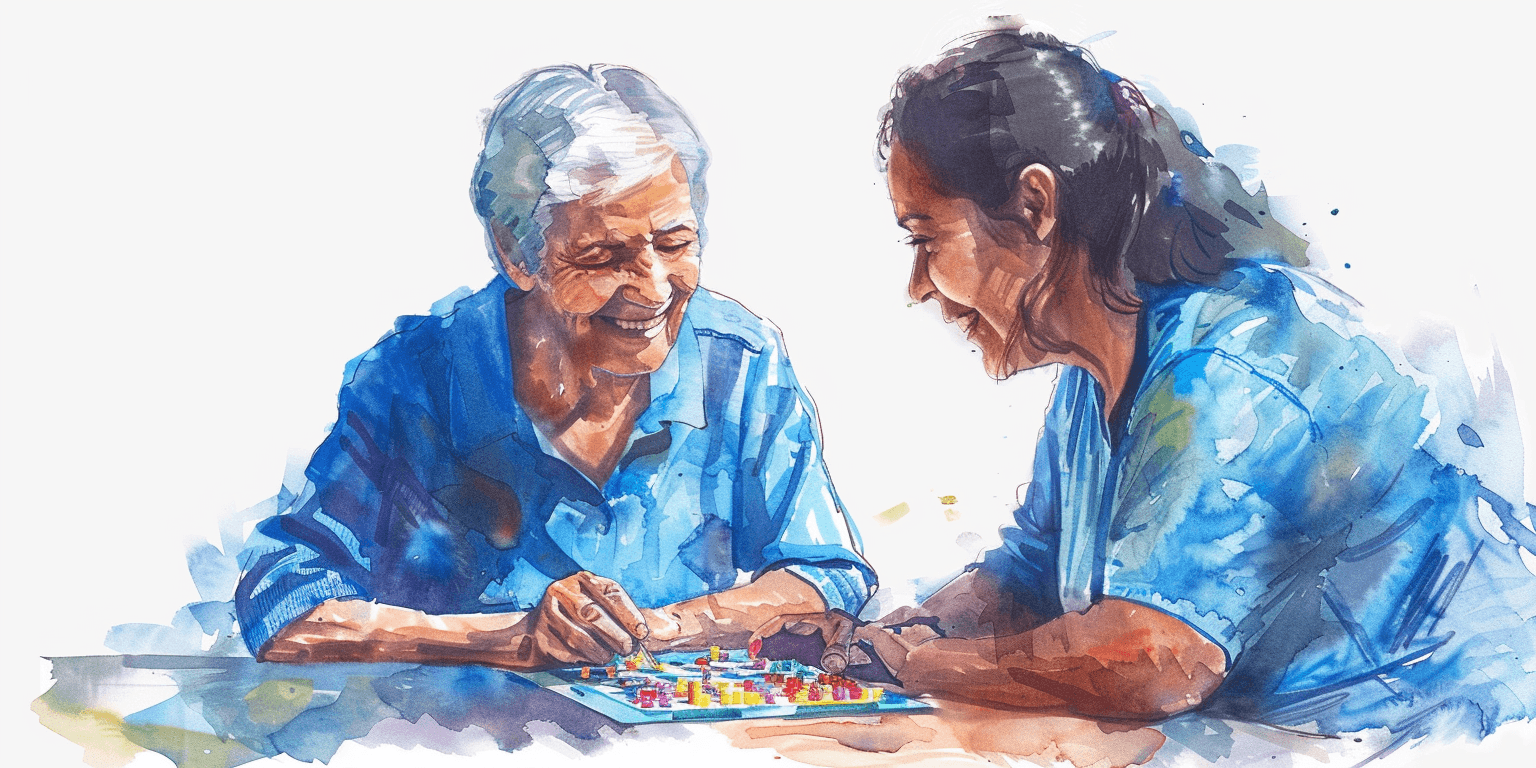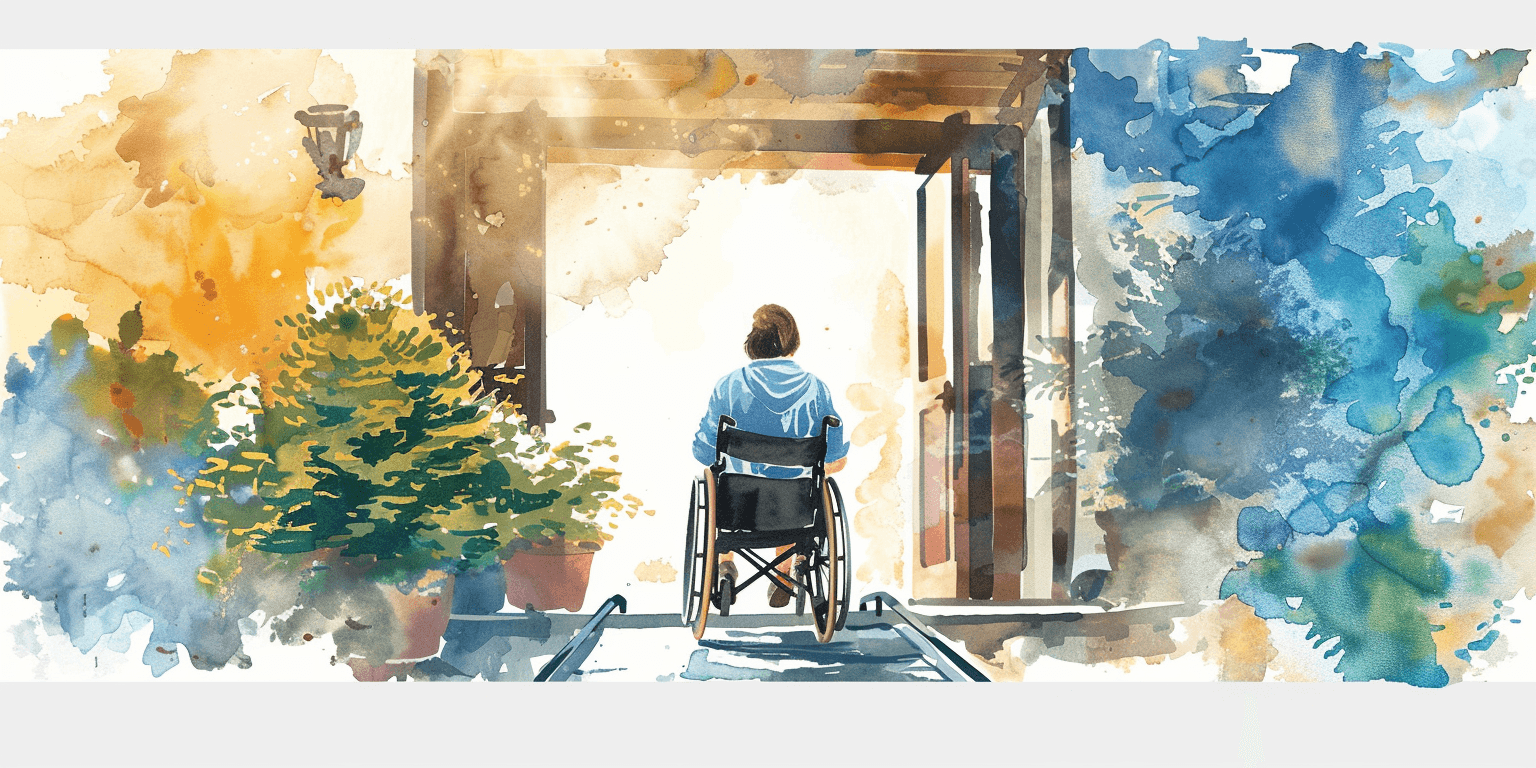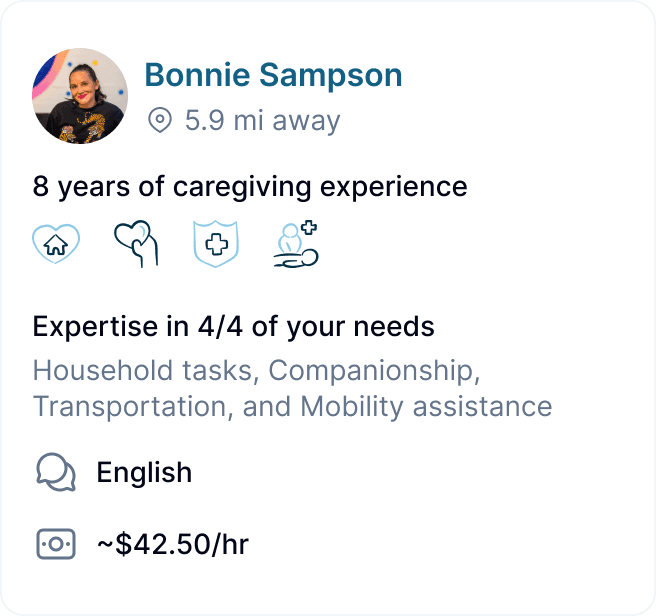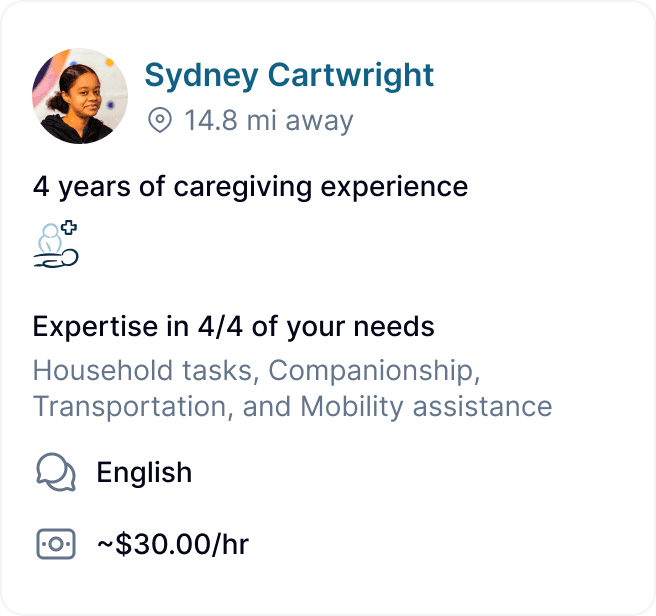Digestive Health Tips for Seniors: Why It’s Often Overlooked



Digestive health is a cornerstone of overall well-being, yet it’s a topic that often slips under the radar-especially for seniors—especially for those aging in place. As we age, our bodies undergo changes that can make digestion more challenging, but many families don’t realize just how much these issues can impact daily life. From discomfort and reduced appetite to more serious complications like malnutrition, digestive problems are common among older adults but frequently go unaddressed.
Let’s explore why digestive health is so important for seniors and why it’s frequently overlooked, and potential solutions to better support your loved one's digestive health.
Why Digestive Health Is Often Overlooked As A Key Part Of Senior Health
Subtle Symptoms and Shifting Priorities
Digestive issues in seniors don’t always present with dramatic symptoms. Instead, they might show up as mild discomfort, decreased appetite, or subtle changes in bowel habits. These signs can be mistaken for “just getting older,” leading families and even healthcare providers to overlook them.
At the same time, families are often focused on more visible health concerns-like mobility, memory, or medication management. Digestive health, while essential, can get lost in the shuffle.
Changing Lifestyles and Eating Habits
Many seniors experience changes in taste, smell, and appetite as they age. Chronic conditions, medications, and dental issues can all affect what and how much they eat. When meals become less enjoyable or harder to prepare, seniors may skip meals or rely on convenience foods that are low in fiber and nutrients-further compounding digestive issues.
Common Digestive Challenges for Seniors
Constipation: Reduced physical activity, dehydration, and lower fiber intake all contribute to constipation, one of the most common complaints among older adults.
Difficulty Chewing or Swallowing: Dental problems or neurological conditions can make eating certain foods difficult, leading to a less varied diet.
Medication Side Effects: Many common prescriptions can disrupt the digestive system, causing nausea, diarrhea, or constipation.
Chronic Conditions: Diabetes, thyroid disorders, and even stress can impact digestive health.
The Power of Personalized Support: How the Right Caregiver Makes a Difference
Meal Preparation Tailored to Individual Needs
One of the most effective ways to support digestive health is through thoughtful meal preparation. A caregiver who understands your loved one’s preferences, dietary restrictions, and cultural background can create meals that are both nutritious and enjoyable. This encourages better eating habits and helps ensure that seniors are getting the fiber, hydration, and nutrients they need for optimal digestion.
Consistency and Companionship
Digestive health isn’t just about what’s on the plate—it’s also about routine and companionship. Seniors are more likely to eat well and stay hydrated when they have someone they trust by their side.
A compatible caregiver can establish regular meal times, gently encourage healthy choices, and provide the social connection that makes eating a more enjoyable experience. See here for more tips on combatting loneliness and social isolation in older adults.
Monitoring and Early Intervention
A dedicated caregiver can also keep an eye out for early signs of digestive trouble-such as changes in appetite, weight, or bathroom habits-and communicate these observations to the family or healthcare team. Early intervention can prevent minor issues from becoming major health concerns.
Digestive Health Tips for Seniors
1. Prioritize Fiber and Hydration
Encourage a diet rich in fruits, vegetables, whole grains, and legumes. These foods help keep the digestive system moving and prevent constipation. Drinking plenty of water is equally important-many seniors don’t realize they’re dehydrated until symptoms appear.
A caregiver who can prepare appealing, fiber-rich meals and offer water throughout the day plays a vital role in supporting these habits.
2. Make Meals Enjoyable and Social
Eating alone can lead to skipped meals and poor nutrition. Sharing meals with a caregiver provides not just company, but also gentle encouragement to eat well.
3. Address Special Dietary Needs
Many seniors have dietary restrictions due to conditions like diabetes, high blood pressure, or food allergies. A knowledgeable caregiver can adapt recipes and meal plans to fit these needs, ensuring both safety and enjoyment.
4. Encourage Gentle Physical Activity
Even light activity, like walking or stretching, can help stimulate digestion. A caregiver can provide motivation and support for daily movement, tailored to your loved one’s abilities.
5. Monitor Medications and Side Effects
With so many prescriptions in play, it’s easy to overlook how medications might be affecting digestion. A caregiver can help keep track of medication schedules and flag any new symptoms for follow-up.
Why Clara’s Approach to Caregiver Matching Matters for Digestive Health
Unlike traditional care options where caregivers are assigned based on availability, Clara puts compatibility front and center. Families are empowered to select a caregiver who not only meets their loved one’s practical needs but also shares their interests and understands their preferences-including in the kitchen.
This personalized approach means your loved one is more likely to enjoy their meals, stick to healthy routines, and feel comfortable discussing any digestive concerns. The result? Better nutrition, improved digestion, and a higher quality of life.
Clara’s caregivers are thoroughly vetted, background-checked, and supported by a dedicated team available seven days a week. With flexible scheduling and affordable rates, Clara makes it easy to find the right match quickly-sometimes in as little as 24 hours.
Taking the First Step Toward Better Digestive Health
Digestive health is too important to be left to chance. With the right support, seniors can enjoy delicious meals, maintain healthy routines, and address issues before they become serious.
If you’re ready to explore how a highly compatible caregiver can support your loved one’s digestive health-and overall well-being—Clara is here to help. Schedule a call with a Clara Care Expert today to discuss your needs and discover how personalized in-home care can make all the difference.
Let Clara help your family take the next step toward a happier, healthier future-one meal at a time.
Digestive health is a cornerstone of overall well-being, yet it’s a topic that often slips under the radar-especially for seniors—especially for those aging in place. As we age, our bodies undergo changes that can make digestion more challenging, but many families don’t realize just how much these issues can impact daily life. From discomfort and reduced appetite to more serious complications like malnutrition, digestive problems are common among older adults but frequently go unaddressed.
Let’s explore why digestive health is so important for seniors and why it’s frequently overlooked, and potential solutions to better support your loved one's digestive health.
Why Digestive Health Is Often Overlooked As A Key Part Of Senior Health
Subtle Symptoms and Shifting Priorities
Digestive issues in seniors don’t always present with dramatic symptoms. Instead, they might show up as mild discomfort, decreased appetite, or subtle changes in bowel habits. These signs can be mistaken for “just getting older,” leading families and even healthcare providers to overlook them.
At the same time, families are often focused on more visible health concerns-like mobility, memory, or medication management. Digestive health, while essential, can get lost in the shuffle.
Changing Lifestyles and Eating Habits
Many seniors experience changes in taste, smell, and appetite as they age. Chronic conditions, medications, and dental issues can all affect what and how much they eat. When meals become less enjoyable or harder to prepare, seniors may skip meals or rely on convenience foods that are low in fiber and nutrients-further compounding digestive issues.
Common Digestive Challenges for Seniors
Constipation: Reduced physical activity, dehydration, and lower fiber intake all contribute to constipation, one of the most common complaints among older adults.
Difficulty Chewing or Swallowing: Dental problems or neurological conditions can make eating certain foods difficult, leading to a less varied diet.
Medication Side Effects: Many common prescriptions can disrupt the digestive system, causing nausea, diarrhea, or constipation.
Chronic Conditions: Diabetes, thyroid disorders, and even stress can impact digestive health.
The Power of Personalized Support: How the Right Caregiver Makes a Difference
Meal Preparation Tailored to Individual Needs
One of the most effective ways to support digestive health is through thoughtful meal preparation. A caregiver who understands your loved one’s preferences, dietary restrictions, and cultural background can create meals that are both nutritious and enjoyable. This encourages better eating habits and helps ensure that seniors are getting the fiber, hydration, and nutrients they need for optimal digestion.
Consistency and Companionship
Digestive health isn’t just about what’s on the plate—it’s also about routine and companionship. Seniors are more likely to eat well and stay hydrated when they have someone they trust by their side.
A compatible caregiver can establish regular meal times, gently encourage healthy choices, and provide the social connection that makes eating a more enjoyable experience. See here for more tips on combatting loneliness and social isolation in older adults.
Monitoring and Early Intervention
A dedicated caregiver can also keep an eye out for early signs of digestive trouble-such as changes in appetite, weight, or bathroom habits-and communicate these observations to the family or healthcare team. Early intervention can prevent minor issues from becoming major health concerns.
Digestive Health Tips for Seniors
1. Prioritize Fiber and Hydration
Encourage a diet rich in fruits, vegetables, whole grains, and legumes. These foods help keep the digestive system moving and prevent constipation. Drinking plenty of water is equally important-many seniors don’t realize they’re dehydrated until symptoms appear.
A caregiver who can prepare appealing, fiber-rich meals and offer water throughout the day plays a vital role in supporting these habits.
2. Make Meals Enjoyable and Social
Eating alone can lead to skipped meals and poor nutrition. Sharing meals with a caregiver provides not just company, but also gentle encouragement to eat well.
3. Address Special Dietary Needs
Many seniors have dietary restrictions due to conditions like diabetes, high blood pressure, or food allergies. A knowledgeable caregiver can adapt recipes and meal plans to fit these needs, ensuring both safety and enjoyment.
4. Encourage Gentle Physical Activity
Even light activity, like walking or stretching, can help stimulate digestion. A caregiver can provide motivation and support for daily movement, tailored to your loved one’s abilities.
5. Monitor Medications and Side Effects
With so many prescriptions in play, it’s easy to overlook how medications might be affecting digestion. A caregiver can help keep track of medication schedules and flag any new symptoms for follow-up.
Why Clara’s Approach to Caregiver Matching Matters for Digestive Health
Unlike traditional care options where caregivers are assigned based on availability, Clara puts compatibility front and center. Families are empowered to select a caregiver who not only meets their loved one’s practical needs but also shares their interests and understands their preferences-including in the kitchen.
This personalized approach means your loved one is more likely to enjoy their meals, stick to healthy routines, and feel comfortable discussing any digestive concerns. The result? Better nutrition, improved digestion, and a higher quality of life.
Clara’s caregivers are thoroughly vetted, background-checked, and supported by a dedicated team available seven days a week. With flexible scheduling and affordable rates, Clara makes it easy to find the right match quickly-sometimes in as little as 24 hours.
Taking the First Step Toward Better Digestive Health
Digestive health is too important to be left to chance. With the right support, seniors can enjoy delicious meals, maintain healthy routines, and address issues before they become serious.
If you’re ready to explore how a highly compatible caregiver can support your loved one’s digestive health-and overall well-being—Clara is here to help. Schedule a call with a Clara Care Expert today to discuss your needs and discover how personalized in-home care can make all the difference.
Let Clara help your family take the next step toward a happier, healthier future-one meal at a time.
Digestive health is a cornerstone of overall well-being, yet it’s a topic that often slips under the radar-especially for seniors—especially for those aging in place. As we age, our bodies undergo changes that can make digestion more challenging, but many families don’t realize just how much these issues can impact daily life. From discomfort and reduced appetite to more serious complications like malnutrition, digestive problems are common among older adults but frequently go unaddressed.
Let’s explore why digestive health is so important for seniors and why it’s frequently overlooked, and potential solutions to better support your loved one's digestive health.
Why Digestive Health Is Often Overlooked As A Key Part Of Senior Health
Subtle Symptoms and Shifting Priorities
Digestive issues in seniors don’t always present with dramatic symptoms. Instead, they might show up as mild discomfort, decreased appetite, or subtle changes in bowel habits. These signs can be mistaken for “just getting older,” leading families and even healthcare providers to overlook them.
At the same time, families are often focused on more visible health concerns-like mobility, memory, or medication management. Digestive health, while essential, can get lost in the shuffle.
Changing Lifestyles and Eating Habits
Many seniors experience changes in taste, smell, and appetite as they age. Chronic conditions, medications, and dental issues can all affect what and how much they eat. When meals become less enjoyable or harder to prepare, seniors may skip meals or rely on convenience foods that are low in fiber and nutrients-further compounding digestive issues.
Common Digestive Challenges for Seniors
Constipation: Reduced physical activity, dehydration, and lower fiber intake all contribute to constipation, one of the most common complaints among older adults.
Difficulty Chewing or Swallowing: Dental problems or neurological conditions can make eating certain foods difficult, leading to a less varied diet.
Medication Side Effects: Many common prescriptions can disrupt the digestive system, causing nausea, diarrhea, or constipation.
Chronic Conditions: Diabetes, thyroid disorders, and even stress can impact digestive health.
The Power of Personalized Support: How the Right Caregiver Makes a Difference
Meal Preparation Tailored to Individual Needs
One of the most effective ways to support digestive health is through thoughtful meal preparation. A caregiver who understands your loved one’s preferences, dietary restrictions, and cultural background can create meals that are both nutritious and enjoyable. This encourages better eating habits and helps ensure that seniors are getting the fiber, hydration, and nutrients they need for optimal digestion.
Consistency and Companionship
Digestive health isn’t just about what’s on the plate—it’s also about routine and companionship. Seniors are more likely to eat well and stay hydrated when they have someone they trust by their side.
A compatible caregiver can establish regular meal times, gently encourage healthy choices, and provide the social connection that makes eating a more enjoyable experience. See here for more tips on combatting loneliness and social isolation in older adults.
Monitoring and Early Intervention
A dedicated caregiver can also keep an eye out for early signs of digestive trouble-such as changes in appetite, weight, or bathroom habits-and communicate these observations to the family or healthcare team. Early intervention can prevent minor issues from becoming major health concerns.
Digestive Health Tips for Seniors
1. Prioritize Fiber and Hydration
Encourage a diet rich in fruits, vegetables, whole grains, and legumes. These foods help keep the digestive system moving and prevent constipation. Drinking plenty of water is equally important-many seniors don’t realize they’re dehydrated until symptoms appear.
A caregiver who can prepare appealing, fiber-rich meals and offer water throughout the day plays a vital role in supporting these habits.
2. Make Meals Enjoyable and Social
Eating alone can lead to skipped meals and poor nutrition. Sharing meals with a caregiver provides not just company, but also gentle encouragement to eat well.
3. Address Special Dietary Needs
Many seniors have dietary restrictions due to conditions like diabetes, high blood pressure, or food allergies. A knowledgeable caregiver can adapt recipes and meal plans to fit these needs, ensuring both safety and enjoyment.
4. Encourage Gentle Physical Activity
Even light activity, like walking or stretching, can help stimulate digestion. A caregiver can provide motivation and support for daily movement, tailored to your loved one’s abilities.
5. Monitor Medications and Side Effects
With so many prescriptions in play, it’s easy to overlook how medications might be affecting digestion. A caregiver can help keep track of medication schedules and flag any new symptoms for follow-up.
Why Clara’s Approach to Caregiver Matching Matters for Digestive Health
Unlike traditional care options where caregivers are assigned based on availability, Clara puts compatibility front and center. Families are empowered to select a caregiver who not only meets their loved one’s practical needs but also shares their interests and understands their preferences-including in the kitchen.
This personalized approach means your loved one is more likely to enjoy their meals, stick to healthy routines, and feel comfortable discussing any digestive concerns. The result? Better nutrition, improved digestion, and a higher quality of life.
Clara’s caregivers are thoroughly vetted, background-checked, and supported by a dedicated team available seven days a week. With flexible scheduling and affordable rates, Clara makes it easy to find the right match quickly-sometimes in as little as 24 hours.
Taking the First Step Toward Better Digestive Health
Digestive health is too important to be left to chance. With the right support, seniors can enjoy delicious meals, maintain healthy routines, and address issues before they become serious.
If you’re ready to explore how a highly compatible caregiver can support your loved one’s digestive health-and overall well-being—Clara is here to help. Schedule a call with a Clara Care Expert today to discuss your needs and discover how personalized in-home care can make all the difference.
Let Clara help your family take the next step toward a happier, healthier future-one meal at a time.
More about senior health
More about senior health


What Is A Care Manager?



Camille Christie


The Physical and Mental Health Benefits of Gardening for Seniors



Quynh Thi Pham, OTS


Stay Sharp, Stay Happy: Fun ways to keep our mind active as we age!



Neelam Dabholkar, MBA


Nutrition Tips for Seniors at Home



Jon Levinson


How In-Home Senior Care Supports Independence



Lowrie Hilladakis


Building a Support Network: How Families Can Strengthen Connections for Seniors



Vanessa Bustos


Preparing for Emergencies: Building a Watertight Senior Care Plan



Ian Gillis


Adapting to Aging: Home Modifications That Make a Difference



Quynh Thi Pham, OTS


The Importance of Physical Therapy in Post-Acute Care



Renée Markels


Aging Policy Landscape: What We Learned



Lowrie Hilladakis
GEt started for free
Better care starts with Clara.
Find, hire, and pay top-notch caregivers without the headache for a price that fits your budget.



GEt started for free
Better care starts with Clara.
Find, hire, and pay top-notch caregivers without the headache for a price that fits your budget.



GEt started for free
Better care starts with Clara.
Find, hire, and pay top-notch caregivers without the headache for a price that fits your budget.


